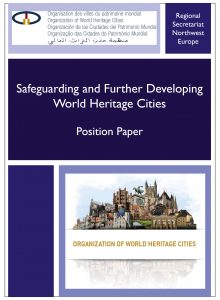Brugge
Belgium
Safeguarding and Further Developing World Heritage Cities (2014)

Coordination: Matthias Ripp, Regional Coordinator of the Northwest Europe and North America Regional Secretariat of the OWHC
Category: Position Papers
Year: 2014
Language: English
Summary: Built environments that are especially worthy of protection, like UNESCO World Heritage Cities, are often affected by intensive use from a wide range of municipal functions. Tourism and associated transportation uses, alongside residential and commercial uses in the retail and service industries, can affect the ecclesiastical and public functions (of a town). This leads to conflicts and requires special and careful planning that is coordinated and integrated. In addition to the resultant challenges, such as achieving a desirable balance between residential and event uses, there lie, within balance, great opportunities to advance economic development by using the UNESCO World Heritage status. In this way a city can develop its own competitive profile. New challenges such as demographic change, climate change, migration trends, and the resultant needs for integration can only be overcome by integrated approaches and an appropriate administrative framework.


